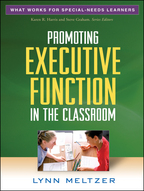Promoting Executive Function in the Classroom
Lynn Meltzer
A Paperback Originale-bookprint + e-book
A Paperback Original
orderMarch 23, 2010
ISBN 9781606236161
Price: $47.00252 Pages
Size: 8" x 10½"
Check out a special package offer including this title!

The reproducible materials can be downloaded and printed in PDF format.
“This very readable book enables teachers to explicitly teach implicit learning skills. It balances research and practice in reminding educators that students can't master the material they need to know if we don't teach them how to do it. Meltzer shares tested strategies and abundant classroom examples. She provides necessary tools for supporting academic growth in a wide range of students, and for helping students experience the critical truth that informed effort is the key to success. This book really gets the job done!”

—Carol Ann Tomlinson, EdD, William Clay Parrish, Jr. Professor and Chair, Department of Educational Leadership, Foundations, and Policy, University of Virginia
“This book succeeds very well in its goal of providing usable information for teachers and other school professionals. The chapters are well written, informative, clear, and practical. The case studies and numerous case examples are excellent. These human touches help to illustrate the many areas of executive functioning that can be supported and enhanced for children with disabilities as well as typically developing children. This book will be an invaluable reference for any school or clinical personnel.”

—Margaret Semrud-Clikeman, PhD, ABPdN, Division Director, Clinical Behavioral Neuroscience, University of Minnesota Medical School
“An excellent, detailed overview of how executive functions can be integrated into classroom instruction for all grade levels. The book is very teacher friendly, including many examples and useable forms and techniques. A major appeal of the book is its focus on creating a classroom culture that fosters executive function for all students, rather than just presenting remediation techniques for those having difficulties. The strategies for screening and ongoing assessment mean that the book can easily be used as part of a schoolwide response-to-intervention or positive behavioral support system. Each chapter follows the same format, explaining first why the area is important, and then how to implement instruction at elementary, middle, and high school levels.”

—Catherine A. Fiorello, PhD, School Psychology Program, Temple University
“Teachers will find this book enormously useful, easy to understand, and easy to implement. Each chapter includes a remarkable array of rubrics, templates, checklists, and examples. The book looks strategically at the role of executive function (EF) in teaching and learning, showing how EF deficits can be impediments to academic, personal, and social success. By creating a culture of EF, teachers and administrators can support the growth of self-aware, resilient, problem-solving students who are ready to take on the challenges of learning, in school and beyond.”

—Lou Salza, MEd, Headmaster, Lawrence School, Broadview Heights, Ohio
—Carol Ann Tomlinson, EdD, William Clay Parrish, Jr. Professor and Chair, Department of Educational Leadership, Foundations, and Policy, University of Virginia
“This book succeeds very well in its goal of providing usable information for teachers and other school professionals. The chapters are well written, informative, clear, and practical. The case studies and numerous case examples are excellent. These human touches help to illustrate the many areas of executive functioning that can be supported and enhanced for children with disabilities as well as typically developing children. This book will be an invaluable reference for any school or clinical personnel.”
—Margaret Semrud-Clikeman, PhD, ABPdN, Division Director, Clinical Behavioral Neuroscience, University of Minnesota Medical School
“An excellent, detailed overview of how executive functions can be integrated into classroom instruction for all grade levels. The book is very teacher friendly, including many examples and useable forms and techniques. A major appeal of the book is its focus on creating a classroom culture that fosters executive function for all students, rather than just presenting remediation techniques for those having difficulties. The strategies for screening and ongoing assessment mean that the book can easily be used as part of a schoolwide response-to-intervention or positive behavioral support system. Each chapter follows the same format, explaining first why the area is important, and then how to implement instruction at elementary, middle, and high school levels.”
—Catherine A. Fiorello, PhD, School Psychology Program, Temple University
“Teachers will find this book enormously useful, easy to understand, and easy to implement. Each chapter includes a remarkable array of rubrics, templates, checklists, and examples. The book looks strategically at the role of executive function (EF) in teaching and learning, showing how EF deficits can be impediments to academic, personal, and social success. By creating a culture of EF, teachers and administrators can support the growth of self-aware, resilient, problem-solving students who are ready to take on the challenges of learning, in school and beyond.”
—Lou Salza, MEd, Headmaster, Lawrence School, Broadview Heights, Ohio



